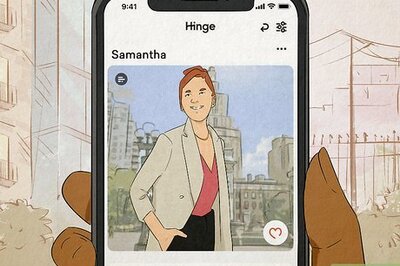
views
It’s a brave new world out there for businesses. Disruptive technologies like the metaverse and blockchain are creating increased transparency and trust, and opportunities for hitherto unknown business models and revenue streams. Drones are creating ever faster and more efficient delivery systems, particularly in hard-to-reach areas. Not to mention the incredible photography. Robotics is making our factories safer and more precise, while AI is automating most of the mundane and process related tasks, while feeding us business insights faster than we can absorb them. OTT and social media have changed how we find and consume media, while improvements in cybersecurity keep us and our data safer than ever before. Moreover, all of this technology isn’t just affecting us at work, but at home too. We’re already automating our homes, and soon, smart-cities will be the norm.
As exciting as this picture is, there’s also a dark side. Most of these technologies are new enough that legal and regulatory frameworks haven’t caught up yet. Most of us don’t understand enough about these technologies to understand the pitfalls that may emerge from their use, and are therefore, vulnerable. While these legal guardrails emerge, can Indian companies afford to remain on the sidelines?
Abhishek Sinha, Associate Dean, School of Law, UPES has his eye on the ball. He talks about the need to be future ready, and how UPES’ 5 year LL.B (Hons.) Program in Disruptive Technologies Law does just that, for law students. He should know. Coming from a strong industry pedigree as an Equity Partner with the Mergers & Acquisitions and Private Equity Team at Khaitan & Co, Mumbai and a Partner with Shardul Amarchand Mangaldas, Mumbai; Abhishek is a dual qualified (England & Wales and India) corporate lawyer with a post-qualification experience of approximately 17 years.

Q: Given that the legal framework for these disruptive technologies are still emerging, is it too early to launch this program?
I think it’s a common misconception that ‘Law’ is a dry, dusty subject that involves rote learning of legal precedents and applicable laws. If that were so, then yes, it’s too early. However, at UPES School of Law, our pedagogy involves teaching lawyers of the future how to think. We focus a lot on experiential and participatory learning. Once the theory has been explained, how is it applied in real life situations? We engage in several activities that involve application of the law. Our students prepare briefs and analyses, argue them in moot court, and learn from each other and the faculty.
Our faculty too is much more diverse than what you’d see elsewhere. Half the course is taught by in-house faculty, and the rest is taught by professors of practice and industry experts who bring in the practical flavour. And mind you, these aren’t masterclasses – these are courses, and such industry experts teach for the entire semester. For us, the core guiding principle is that we churn out industry ready lawyers, not students of the law who need extensive hand holding on the job.
Q: You’re talking of bridging the industry-academia gap here, which is something of a norm in academic circles today. How is your pedagogy different?
As I mentioned, the focus isn’t on rote learning and memorisation. Our classroom sessions, for instance, depend on lecture-based sessions for just 30% of the time. The rest is spent on situational understanding of the provisions of law, which is creating those sticky situations. How do we achieve it? We give them hypothetical situations, and we give them reading material; based on those they have to derive their analysis. They already have the laws and the facts in front of them, and that’s the way we assess them. In fact, our midterm examination is completely based on hypothetical or situation based assessment.
Similarly, we assign transactions and they need to research them and prepare their findings and recommendations. Ditto with negotiations – we have mock negotiations and mock trials in class, which is a slightly different, but very effective approach vis-a-vis the class presentation approach taken elsewhere. We constantly work to set up situations that they’ll encounter at work – situations that clients will bring to their law firms.
Then there are formal moot court sessions where they get to argue their assessments and their oratory skills come into the picture. Here too, there is a lot of support in developing these skills through our School For Life courses where students learn to apply an in-depth understanding of attained life skills and broad-based subject competencies along with core subject qualifications.
Moreover, our courses themselves are the result of industry alliances. Several of our courses are co-developed and co-delivered by industry partners. We also have academic tie ups with several universities abroad, which creates unmatched global opportunities through our exchange programs.
Q: Coming back to the Disruptive Technologies Law program, how are you applying your unique pedagogy to this emerging field?
For starters, the syllabi and the curriculum has been created in collaboration with the industry. UPES didn’t just decide on these programs. There was a lot of deliberation with the industry, and we took their feedback on what they felt were the needs of the hour.
Second, if you look at any of these modules, say metaverse, blockchain, drone laws, robotics, cybersecurity, data privacy, OTT related laws, smart-cities or autonomous vehicles; all these have the underlying basis of the technology itself, before the legal aspects. If you don’t understand the technology, how will you appreciate the need to legally regulate it? You will neither be able to understand the legal design behind it, nor the issues relating to IPR. Therefore, on the pedagogy side, 50% of our sessions will be delivered by industry partners for this honours program.
The basic concepts and fundamentals will be explained by the industry experts, along with the issues and challenges the industry is facing. Only after that do we jump onto the legal constructs and legal analysis. We are building that base where you understand these concepts, and you are an expert in that law (because the laws, the rules, the regulations are limited). Moreover, you can then connect everything to the constitution.
Ultimately, we deal with either public policy, fundamental rights, or public interest. All disruptive technologies, be it metaverse or blockchain or anything else that may emerge, relate to the economy. The economy, in turn, connects us to public policy, and everything connects to the Constitution. This is the connection we try to explain, because once understood, students can look at the same constitutional provision with different eyes.
Q: Do you see a lot of demand for your graduates? Given that a lot of the action in establishing case law for disruptive technologies is happening in the west, how do you see this translating into a demand for these skills in India?
It’s a perception that things are only happening in the west because their stories are getting highlighted. This is because their judicial system is very, very proactive: within a few days you get the judgement. But all these technologies, whether you talk about AI, robotics, metaverse, blockchain, are already present in India. They are having a significant impact on the industry.
Another point to note: these specialisations will be offered next semester to the students. By the time they graduate, we’ll all already be five years from today, right? Five years down the line, this is going to be the most significant practice area, the most important practice area.
All these technologies fit into different areas of the industry. We’re using them already, for everything from business insights to automating email responses. So if you don’t understand the ethics behind it, the law, and the intellectual property related issues behind these technologies it’s difficult to survive in the industry and even give proper advice to your clients. From a commercial standpoint will this kind of honours program help students to monetize their investment? Absolutely. Yes.
Q: If you had to think of the biggest advantage that you’re able to bestow on your students versus other colleges, which of course will start to, at some point, begin to offer similar specialisations, what would you say sets UPES apart?
Anyone can replicate the syllabi, of course. We’re in the public domain. But how will they replicate the way we are executing this course? How will they replicate the way we engage with the industry? How will they replicate our intent and vision? And if they’re able to replicate it, I’ll be very, very happy about it because that means more students get that kind of exposure.
For UPES, that would be another point of pride. In terms of recognition, we are ranked 21st in India in the Law Category by NIRF 2022 and among the Top 10 Law colleges in India by India Today Best Rankings Issue 2021.
Moreover, our placements speak for themselves. We have approximately 19 alumni appointed as judges at various courts in India. Some of our alumni are partners in top tier law firms. We had a good placement last year and are going strong this year as well. Our list of recruiters is growing each year.
Q: Tell us more about the AI based digital law professor at UPES School of Law?
I created India’s first AI based digital law professor, named ABSIN (which is a short form of my name). It’s my digital avatar and is powered by ChatGPT4 and me. There are a few interesting courses and projects, on which we are working with ABSIN. We are very excited about the future with AI. Here’s the link to ABSIN’s introductory video.
This is a Partnered Post.
Read all the Latest News here















Comments
0 comment